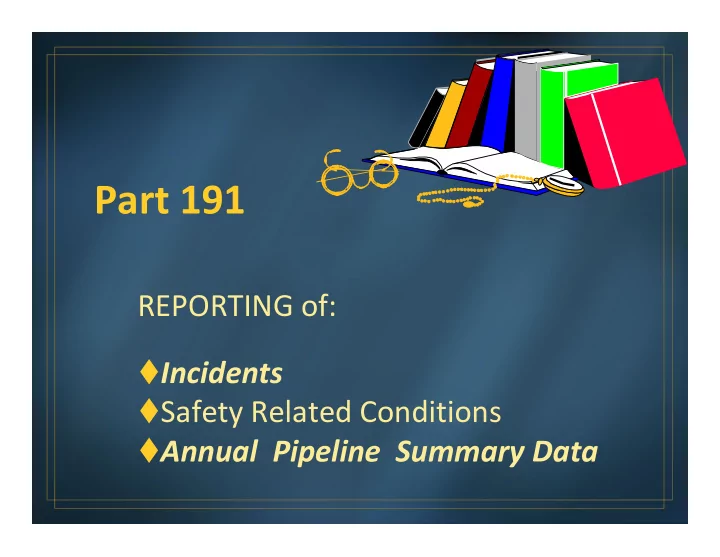

Part 191 REPORTING of: � Incidents � Safety Related Conditions � Annual Pipeline Summary Data
Incident Incident means any of the following events: Incident means any of the following events: (1) An event that involves a release of gas (1) An event that involves a release of gas from a pipeline, or of liquefied natural gas, from a pipeline, or of liquefied natural gas, liquefied petroleum gas, refrigerant gas, or gas liquefied petroleum gas, refrigerant gas, or gas from an LNG facility, and that results in one of from an LNG facility, and that results in one of the following consequences: the following consequences: Proposed language
Incident (cont) …results in one of the following consequences: (i) A death, or personal injury necessitating in ‐ patient hospitalization; (ii) Estimated property damage of $50,000 or more, including loss to the operator and others, or both; Proposed language
Incident (cont) …results in one of the following consequences: (iii) Estimated gas loss of 3 MMCF or more;
Incident Emergency Shutdown of an LNG Facility (Activation of ESD for reasons other than an actual emergency does not constitute an incident)
Incident Judgment of the Operator Media? Outages ‐ # customers? Road closures?
Immediate Notice: National Response Center 1 ‐ 800 ‐ 424 ‐ 8802 or http://www.nrc.uscg.mil Earliest “Practicable Moment” following discovery ~ No Later than 2 Hours
Report Submission §191.7 states each report required by this section must be submitted electronically http://opsweb.phmsa.dot.ogv
Report Submission §191.7 If electronic reporting imposes an undue burden and hardship, operator may submit written request for an alternative reporting method. Request must describe the undue burden and hardship PHMSA will review request, and may authorize in writing and alternative reporting method.
Incident Reports Due 30 days after DETECTION of Incident May Require Additional Reports
Annual Reports Due on §191.11- Distribution March 15 §191.12 – Distribution Systems: Mechanical Fitting Failure Reports § 191.17 – Transmission, gathering, and LNG
§191.22 – National Registry of Pipeline and LNG Operators Effective January 1, 2012, each operator of a gas pipeline, gas pipeline facility, LNG plant or LNG facility must obtain and Operator Identification Number. Operator who already has OPID must, by January 1, 2012, validate the information associated with each OPID number , and correct the information as necessary, but no later than June 30, 2012. Operator must use assigned OPID for all reporting requirements.
§191.22 – National Registry of Pipeline and LNG Operators Operator must electronically notify PHMSA if certain events; Notify not later than 60 days before the event occurs: • Construction, rehabilitation, uprate, or update of facility (other than line pipe) that costs ≥ $10 million • Construction of 10 or more miles of a new pipeline • Construction of a new LNG plant or facility
§191.22 – National Registry of Pipeline and LNG Operators Operator must notify PHMSA no later than 60 days after the following events: Change of primary entity (OPID) for managing or administering a safety program required by this part covering pipeline facilities operated under multiple OPIDs Change in name of operator Change in entity responsible for existing pipeline, pipeline segment, pipeline facility, or LNG facility Acquisition or divestiture of ≥ 50 miles of pipeline or pipeline system subject to Part 192, or existing LNG plant or facility subject to Part 193.
National Pipeline Mapping System (NPMS) PSIA 2002 requires all operators to submit data appropriate for use in the National Pipeline Mapping System (NPMS). Complete data submission includes the geospatial data, attribute data, and metadata for all LNG, hazardous liquid, and natural gas transmission pipeline operation systems operated by a company
National Pipeline Mapping System (NPMS) Updated annually by March 15 (ADB 08 ‐ 07), or e ‐ mail stating no changes
Recommend
More recommend